If you’re interested in intermittent fasting, you could wonder how it compares to other diets. How effective is it for weight loss? How easy is it to follow? What are the effects on your body? What about muscle? How intermittent fasting differs from other types of diets?
Intermittent fasting is more a habit of eating less often, restricting your eating window, than an actual diet. You can apply any diet you want in pair to intermittent fasting, but you should avoid outdated diets, such as low-fat or low-calories, and focus on eating healthy food and reducing carbs for the perfect combination.
Just by reading the title of this blog, you should know I am an “intermittent dieter”. Meaning I like going out, having drinks, partying, I’m also a huge food lover and a big believer of cheat days (even if science might not be).
To summarize, I want to find the path of least resistance, what diet is the most effective, with the least effort and the least compromises for me (eating habits, social life). But that’s me, so I’ll address that, but also how effective it is for weight loss, regardless of its convenience.
A little disclaimer:
Since many of these diets might share the same pros/cons or only have small differences between them, there will be some repetition if you read the entire article.
I also didn’t include any type of Vegan Diet because, while it is effective for weight loss and can have many benefits, it’s not simply a diet you implement, it has more to do with your beliefs than trying to lose weight.
Diets comparison
Low-fat/Ultra-low-fat Diet
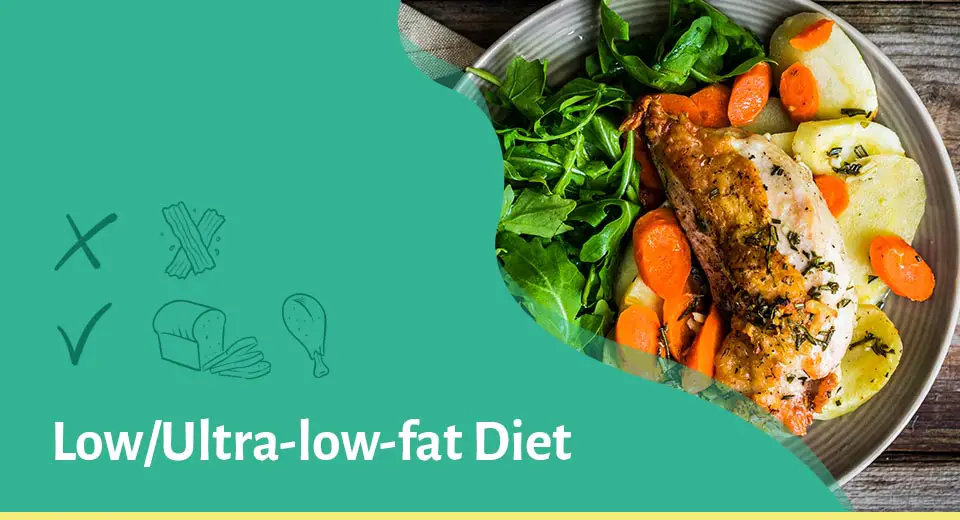
How it works
We’ll start with one of the most infamous diet out there.
Low-fat diets have been around for quite a while and we can trace the trend back to 1977 when the McGovern Commission decided to limit all fat intake in order to fight cardiovascular diseases and obesity.
The Commission was founded by the U.S. government, both them and the American Heart Association stressed that you should avoid fat intake because saturated fat was responsible for higher levels of cholesterols.
Studies have been conducted since then to prove the hypothesis, without ever being able to do so. Leaving people still thinking today that fat is the bad guy and atherosclerosis (clogging arteries) comes from fat consumption.
Take a look at my article on arteries clogging to see that every study since then has proven this wrong.
Based on that, people still have a hard time adding cream or butter to their meals. While reducing fat to a minimum can help weight loss in the short term, it’s not healthy, nor recommended.
Due to very few scientific evidence on those subjects, the recommendation was dropped in general indifference in 2010. Without mentioning that those 1977 recommendations are mostly responsible for today’s obesity disaster.
Check out this freely available paper written in 2016 by Julia Reedy on the subject if you want to know more.
Low-fat diet means you get no more than 30% of your daily food intake in fat. Very-low-fat reduces this number to 10%.
This means that you’ll avoid trans fats, keep saturated fats to a minimum and get most of your calory intake from lean proteins and carbohydrates.
As a side note, when following this type of diet you will replace most of your fat intake with carbs. When doing so you should :
- Eat good carbohydrates such as whole-grain, fibrous vegetables, fruits, beans
- Limit carbs with a high glycemic index such as white bread, pasta, pizza
- Avoid so-called low-fat food which is generally full-packed with sugar and refined carbohydrates
Effects on the body
If you limit fat in your diet while still eating healthy proteins and carbs I mentioned, low-fat diet will make you lose weight. Especially in the short-term, since any type of nutrient restriction is bound to make you lose some pounds in the beginning.
Regarding coronary heart disease, thinking a low-fat diet will prevent it is a theory of the past. Evidence is weak at best. Again, it all depends on what you replace the fat intake with.
A healthy low-fat diet can improve your condition and improve heart health too. But it comes more from implementing a low-fat healthy diet, than removing fat from your diet.
Every study I found about the benefits of low-fat diets also mentioned other types of diet improvement mainly high fiber diet (on kids or on obese men).
I want to put emphasis on the fact that while low-fat itself isn’t inherently good, replacing high-fat, refined carbohydrates by a low-fat, high-fiber, whole grains and lean protein diet will improve your condition.
Another side effect of low-fat diets can have is on mental health. You might not know this, but the brain is mostly compiled of saturated fat and cholesterol, which insulates the myelin layer surrounding nerve fibers and preserves the proper function of the brain and nervous system.
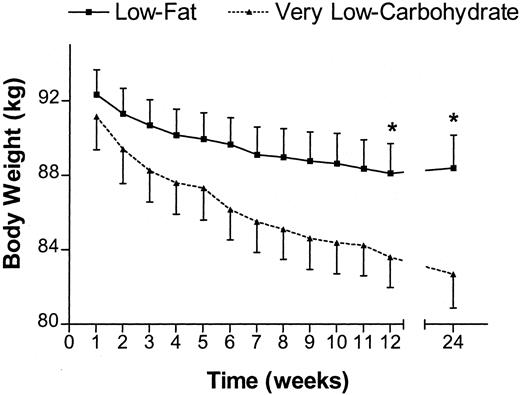
More insulated myelin means more brain function. So cutting fat from your diet can impair brain function, promote brain fog, change in mood.
Pros
- There’s no restriction on carbohydrates
- It can induce short-term weight loss
Cons
- It won’t promote a healthy diet
- There are very few evidence of the actual health benefits and impact on weight loss
- Poor mental health
How it compares to intermittent fasting
When it comes to weight loss, it really depends on how you implement low-fat, since it doesn’t say much about your refined carbohydrates and sugar consumption. You will lose some weight, but not significantly.
The problem is, low-fat in itself hasn’t been a proven way to lose weight and improve your overall diet. And finding testimonies of people losing lots of weight with low fat is complicated.
It’s not easy to implement, it doesn’t promote tasty foods, it’s restrictive and it won’t impact your cravings and eating habits.
As opposed to intermittent fasting trains your body to burn fat for fuel, reduces appetite and cravings in the long term. It’s easy to implement and it lets you eat any way you want.
And one meal a day intermittent fasting can be implemented quite easily and will make you lose weight. 16/8 intermittent fasting, two meals a day, might be enough to prevent you from gaining weight even when eating normally.
Implementing a low-fat diet as a way to lose weight has been done by almost everybody. Since 1977, it’s been and still is, in everyone’s mouth: eating fat will make you fat.
More than 40 years after, no study has been able to directly link fat to heart disease and obesity. And since, like most people, you’ve eaten some kind of low-fat diet at some time in your life. So, you already know it’s not that effective.
Yes changing a bad diet to a good healthy low-fat diet will make you lose weight. And following these guidelines is not inherently bad for you. The problem is low-fat doesn’t necessarily mean eating healthy food.
Keeping a healthy low-fat diet will simply be hard, without significant results in the long term. There are many other proven diets that are way more effective, less restrictive and tastier, than low-fat.
Low-calorie Diet
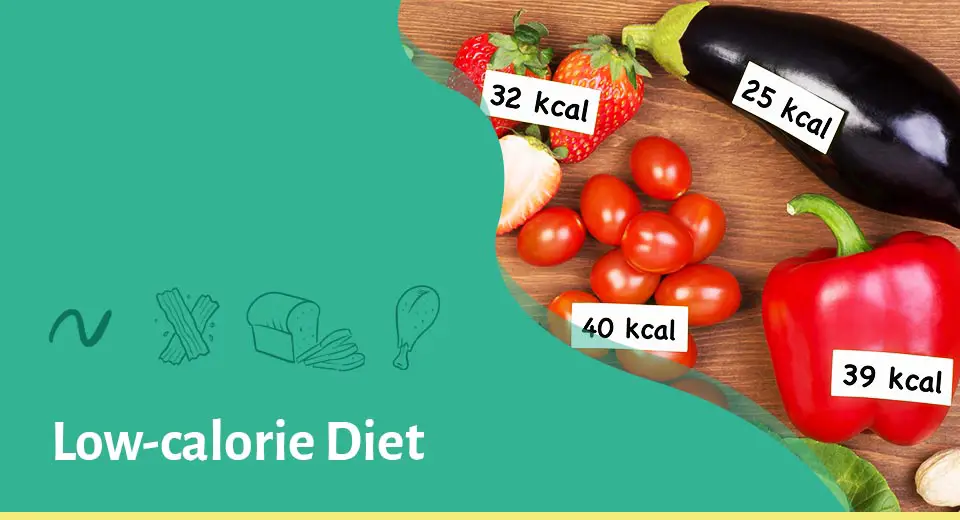
How it works
A low-calory diet can mean many things. In some way, intermittent fasting reduces calorie consumption so it’s some kind of low-calory diet.
For the sake of the argument, I’ll talk specifically about losing weight by counting calories. The idea when starting a calorie restriction diet is to calculate your daily caloric needs.
Once you know your body will need 2’500 calories to function properly, you can reduce your daily intake to 2’000 for example. The idea is not to overdo it at first, you could simply reduce by 100 at first to makes things easier.
This then means counting calories intake for every food you eat in order to avoid getting too much. Once your body is used to working with 500 hundred calories less, for example, you can then go down to 1’500 calories progressively.
Effects on the body
When you reduce calory intake, your effectively telling your body that it should try working with fewer calories. So, it will naturally try to adapt to this by reducing caloric expenditure and burning fat for energy.
When getting fewer calories than your body actually needs, your glycogen stores will get depleted (the body’s very own glucose stores) and then, your body will start tapping into your fat.
Since fat also comes with some energy cost for the body, that’s good, your reducing fat and reducing your body’s caloric expenditure.
But if you’re still eating 3 to 5 times a day, but not getting enough calories in the meantime, your body will think that food is scarce where you are. You’ll enter some type of starvation mode.
This will lead you to feel tired, cold, sometimes nauseous because the body will try to limit any expense of energy it can in order to function in this state.
To keep calorie expenditure to a minimum, your body also starts breaking down muscle. Remember, your body’s trying to “survive” in a state of starvation, so it’s doing everything it can to adapt.
All these will be hard, but it’ll cause weight loss and, depending on the type of diet, it can lead to impressive results, up to 5 pounds a week. The big culprit of the diet comes when you achieved your goal and start eating normally again.
During the diet, your body’s metabolic rate falls down drastically. Its ability to burn calories becomes much, much slower, which figures since your body was trying to burn as few calories as possible.
So, you’ll gain weight much quicker because your body won’t be as good to burning calories as it was before. If you want to keep the weight off, you’ll have to keep regulating your calory intake.
That’s not great for your body and that’s really hard to keep up.
Pros
- You’ll lose weight
- There are no forbidden food
- You’ll be able to eat 3 to 5 times a day
Cons
- You’re putting huge stress on your body
- You’ll lose fat but also muscle
- You’ll slow down your metabolic rate
- You’re in danger of getting all your pounds back and then some when you stop
- The side effects are hard on you
- Counting calories of everything you eat is quite cumbersome
How it compares to intermittent fasting
You might think the so-called “starvation mode” is more adapted to intermittent fasting since you’re not eating at all for a given period, your body will get into starvation.
Not exactly, eating only occasionally (once a day or even less) is a far more normal state than you might think. 3 meals a day as been around for around 100 years, it came with the industrial revolution.
Before that, people were used to eating less frequently. And the body is great at that, it’ll simply use stores of energy in your body and, in the long run, it will get really good at burning fat for fuel.
When you’re doing a low-calorie diet, it’s not restricting your eating window. You’re free to eat as often and whenever you want, as long as you don’t get too many calories.
In this state, your body is constantly getting food, so it’s constantly getting energy. Since you’re only looking at calories, not at the type of food you’re eating (carbs, proteins, fat), you’ll be getting some glucose through your diet.
Your body will burn fat for energy to preserve itself, but it won’t get as good and a lot of the weight you’ll lose will also come from muscle break down.
Another difference between low-calorie and intermittent fasting is that while the former will reduce metabolic rate, the later will increase it. Meaning your body will be far more effective at burning calories.
Reducing calory intake will make you lose weight but it will be hard to follow such a diet and, moreover, really hard to keep the weight off since it’ll reduce your metabolic rate.
Check out this study done on 14 contestants in the show the Biggest Loser, to see how low-calorie diet made them lose weight, but also how their weight was affected after the show was done.
Not only did they regain some weight, in some cases most of it, but even after 6 years the metabolic changes that occurred during the diet still persisted.
A low-calorie diet is just not doable in the long-term and it’s disadvantaged far exceed its benefits, the diet world changed deeply in the last 30 years, there are easier, more effective alternatives backed by science.
Dukan Diet
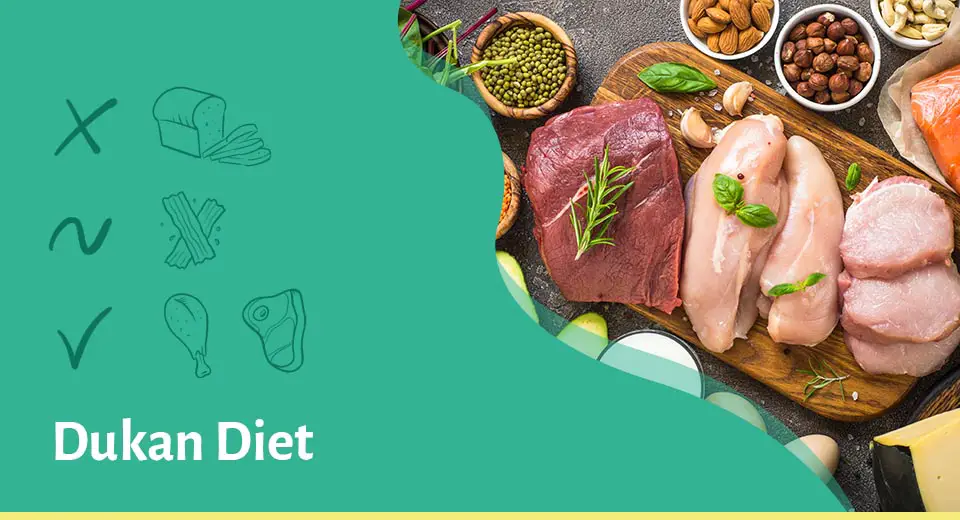
How it works
The Dukan diet is a low-carb, low-fat and high protein diet. It’s been very popular for weight loss since its creation in the 1970s. With the Internet, it gained even more popularity in the 2000-2010s.
You begin by calculating your ideal weight, called the true weight in the diet, based on your age and other factors. Then the diet is composed of four phases :
- Day 1 to 7 – Attack phase: You can eat as many lean proteins as you want (chicken, eggs, lean beef, lean pork) but no more than 5 ml of oil a day, 9 grams of oatmeal (mandatory) and at least 1.5 liters of water (mandatory too)
- Month 1 to 12 – Cruise phase: You alternate lean proteins one day and lean proteins and vegetables (non-starchy veggies, such as broccoli, cauliflower, spinach, cabbage, tomatoes, etc.). Fat consumption is still limited to 5 ml of oil a day, 1.5 liters a day is still mandatory and oatmeal too (12 grams a day).
- Consolidation phase: This will be done for 10 days for every kg (2 pounds) lost in phase 1 and 2. The idea here is to introduce other foods in your diet such as fruit (100 grams max), bread (two slices of whole bread max), cheese (40 grams max per day), etc. These will be mixed with what the phase already allows you.
- Indefinite – Stabilization phase: Once you’ve reached your true weight, keep on the consolidation phase for as long as you want. You can get a bit more flexible, as long as you don’t gain more weight.
There’s more to all this if you check out the diet and, as you can see, it’s not really an easy diet to follow.
Effects on the body
The Dukan diet appears to be effective for immediate weight loss, this study shows an impressive 15 kg weight loss in 8 to 10 weeks while eating around 1’000 calories a day and 100 grams of proteins.
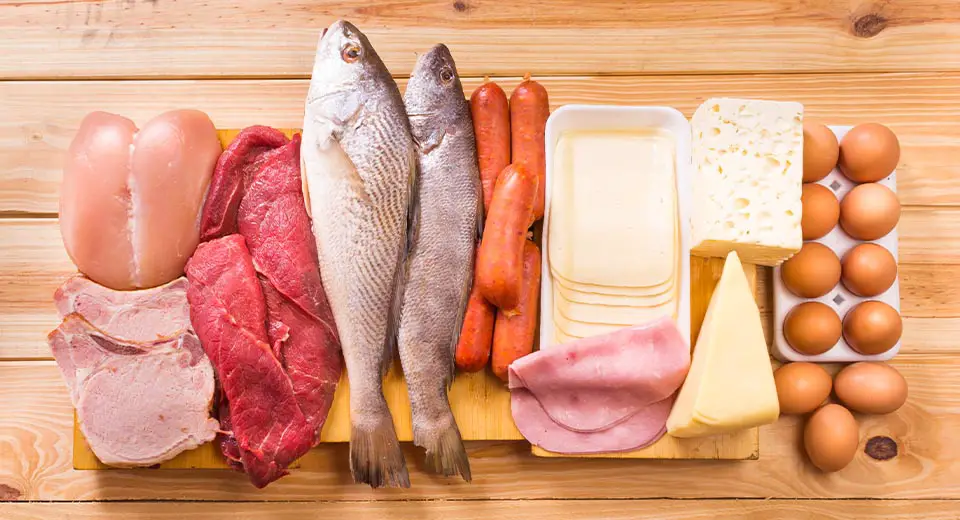
The problem of this diet is that it’s not exactly based on rock-solid evidence, while high-protein and low-carb diet are known to deliver results, based on several studies, the specifics of the Dukan diet have not been subject to many studies.
When eating low-carb, some of the proteins you’ll get will be turned into energy through a process called gluconeogenesis, some could potentially be turned into fat, but with such a low calory consumption it mostly won’t.
Protein will also help make you feel more satiated, through increased metabolic rate, and decreased levels of ghrelin (the hunger hormone).
But the basic idea of restricting not only carbs on a diet but fat too is not based on any actual evidence. Even going so far as saying restricting fat is less effective for weight loss.
The Dukan diet is also very low in fibers and so high in proteins that people with risks of kidney stones could worsen their condition. It shouldn’t affect a healthy liver though, contrary to what I thought at first.
While Dukan can be effective for immediate weight loss, and it is, keeping the weight down might reveal complicated since the infinite phase is still pretty restrictive.
Pros
- It works for weight loss
Cons
- Hard to follow
- No hard science to back up the high-protein, low-carb and low-fat idea
- No evidence on long term results
- Restricting of good healthy foods (good fibers, good fat)
- Hard on the liver
How it compares to intermittent fasting
The Dukan diet is a program with restrictive eating habits and planning to follow for a year or more. It’s effective for immediate weight loss and when you’ve reached your true weight you’ll need to create good eating habits.
Intermittent fasting as you know is not restrictive as to what to eat, but when you eat. Dukan will let you eat whenever you want, as long as you keep to the permitted food. It’s 3 pm and you’d like a boiled egg? Sure!
Intermittent fasting needs you to form a habit of eating less often. Once it’s implemented, you can play with it with shorter eating windows, fewer meals a day, but you can still eat any foods you want (I would emphasize healthy food of course).
So IF once implemented is a whole lot easier to follow and it won’t cause you to restrict any healthy food. Although it might not make you lose weight as quickly, in the long term it’ll be easier to keep it off.
Atkins Diet
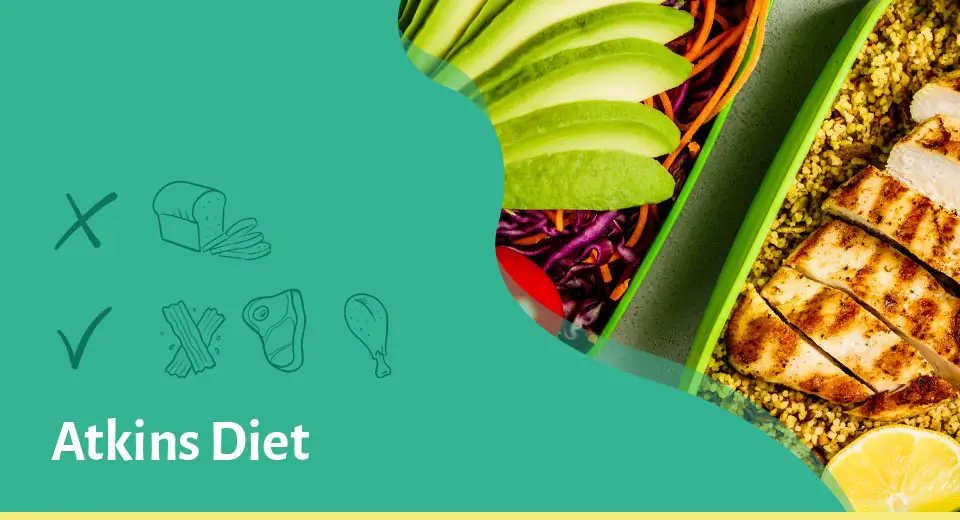
How it works
The Atkins diet is the most well-known low-carb diet, created by Robert Atkins and made popular by its 1972 book. The diet has since then gained much popularity and many other books have been written about it.
The diet lets you eat as much fat and protein as you want as long as you keep away from high-carb foods. Of course, first it was frown upon since high-fat diets weren’t exactly the norm in the 70s.
Since then though, several studies done on saturated fats showed they’re really not that bad, and low-carb diets have been gaining a lot of popularity, with many, many studies proving its effectiveness.
The Atkins diet specifically is composed of 4 phases:
- Induction – Phase 1: Less than 20 grams of carbs a day and as many proteins and fat as you want, for 2 weeks.
- Balancing – Phase 2: Bring back other types of food in your diet, such as nuts, low-carb vegetables and fruits (spinach, kale, broccoli, berries)
- Fine-tuning – Phase 3: This happens when you’re reaching your goal weight, you’ll be reintroducing carbs slowly to slow down weight loss (yep, that sounds weird for a diet)
- Maintenance – Phase 4: Once you’ve lost all the weight you wanted to lose, you can eat as many healthy carbs as you want, as long as you’re not putting on any weight
That’s the plan, even though you can also simply take a look at what foods you can eat on an Atkins diet, drastically cut down the carbs, forget about the phases and it should work too.
The idea of the phases is mostly to help and structure the process, for example, the induction phase is used to kick off weight loss at the beginning.
Effects on the body
The Atkins diet is backed-up by an impressive battery of studies on obesity, weight-loss, diabetes, cardiovascular diseases, etc. They even advertise that on the diet’s official website, check it out.
When you eat low-carb, what will happen is that your body won’t be releasing as much insulin. Upon eating, some insulin is secreted by the liver in order to break down what you ate for energy.
Insulin secretion depends on the type of food you get, take a look at this graph showing the effect of carbs, proteins and fat on insulin secretion. The former will raise insulin levels a lot and the later only by a small amount.
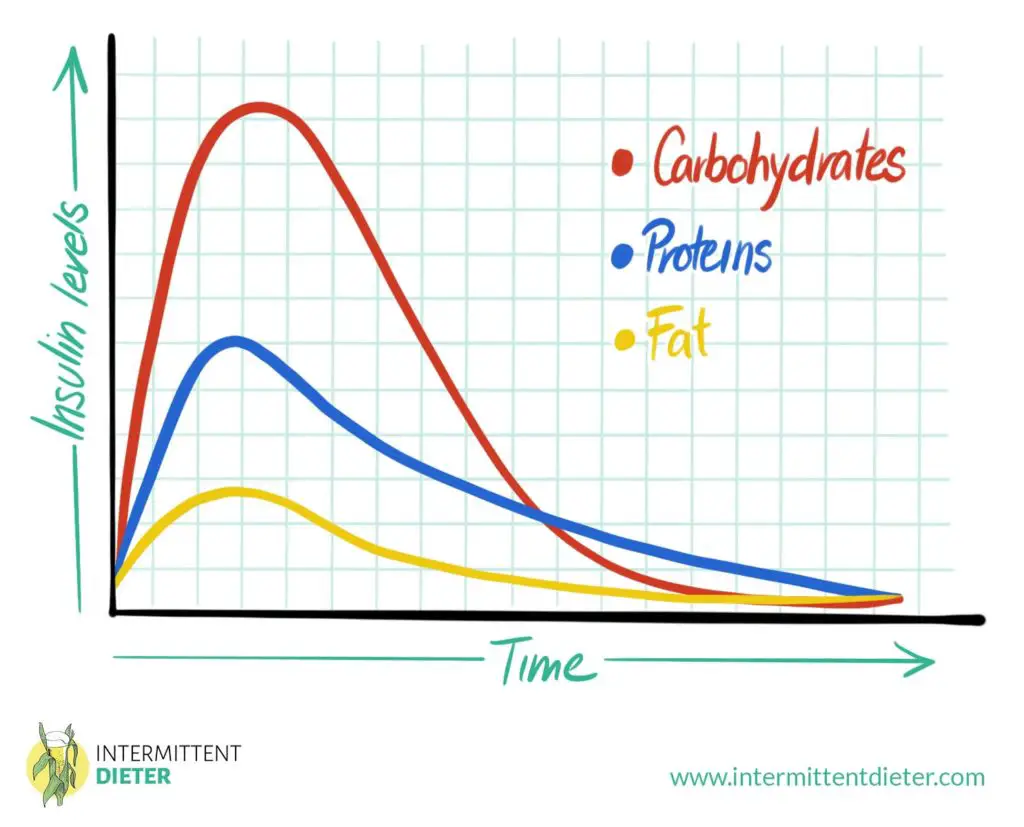
Meaning when you eat carbs, your body will secrete lots of insulin to use what you ate for energy. When I say use it, it means it’ll be broken down and used either immediately in the mitochondria, put in glycogen stores or stored as fat.
When you’re not eating carbs, insulin levels will raise a lot less and you’re body won’t get as much as energy from the food you ate.
Some energy will be created from the proteins, through a process called gluconeogenesis (new glucose making), and fat, but mostly, your body will have to rely on your glycogen stores first, then your fat stores for energy.
As long as you get very few-carbs, you won’t get much energy from what you eat, so you’re body will turn to fatty acids in the blood and in your fat stores for energy, burning down your fat.
Pros
- You will lose weight
- It will help reduce other severe conditions like diabetes or risks of cardiovascular diseases
- Apart from carbs, you are free to eat anything you want
- No time restricting eating windows
- Keeping the weight down won’t be hard
Cons
- You will have to reduce carbs to a minimum
- No alcohol and no sugar treats
- It’s not always easy to keep up on an everyday basis (social life, restaurants, etc.)
How it compares to intermittent fasting
The Atkins diet, or any other type of low-carb diet, is often recommended with IF. Together, they’ll induce important and sustainable weight loss.
A low-carb diet is definitely a great way to lose weight, with no disadvantages, when it comes to health, that I can think of. And if you think it’s easier for you to cut down carbs than restricting your number of meals, that’s a perfect alternative to intermittent fasting.
But if you like having a drink, the occasional chocolate with your coffee, you love bread, pizza, pasta, etc. it might be easier to try intermittent fasting.
For optimum weight loss, you can combine the two, or simply reduce carbs intake in the long run with IF. You’ll see that when implementing some type of fasting or low-carb diets, certain cravings (sugar, carbs) and your appetite will reduce.
Ketogenic Diet
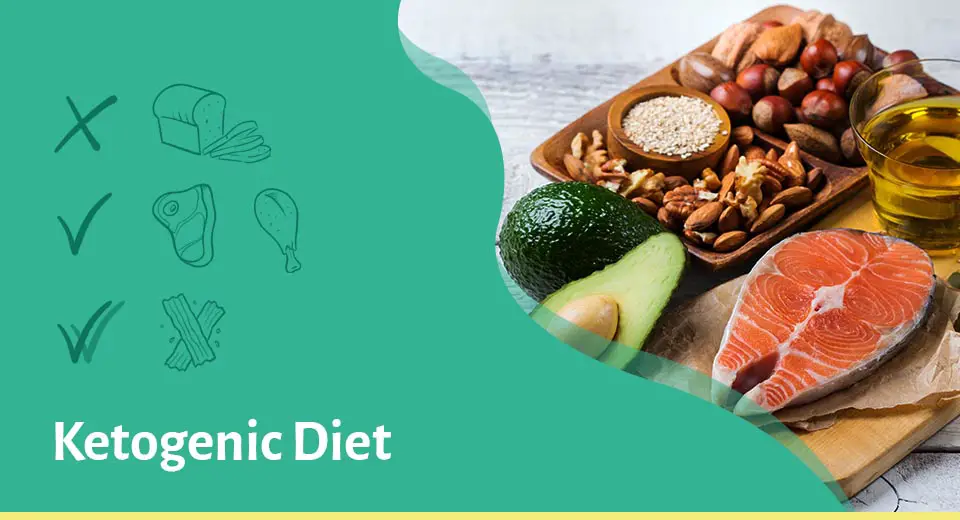
How it works
The ketogenic diet is quite similar to a low-carb or Atkins diet. It differs in the fact that this is a very-low-carb, high-fat diet and puts emphasis on the later. You’ll be replacing 90% of your carbohydrates intake with fat.
There are 4 types of ketogenic diets out there :
- Standard: Your daily food consumption has to come 75% from fat, 20% from proteins and 5% from carbs.
- High-protein ketogenic diet: This one is pretty similar but with higher protein intake, 60% fat, 35% proteins and again 5% carbs
- Cyclical ketogenic diet: This is similar to the standard diet on keto days, except you do 5 days of keto and 2 days of higher-carbs intake (good carbs though). I mentioned it in this article, where I wondered if keto could be done every other day.
- Targeted ketogenic diet: This diet allows for more carbs intake around workouts.
The two last diets are specifically aimed at athletes or bodybuilders and, for this article, I’ll only talk about standard keto. Since that’s the one most people use and the only one with sufficient studies to talk about.
Effects on the body
As I mentioned in the Atkins diet description, the idea is to cut down your carb intake to force your body to use fat as fuel.
The ketogenic diet bears this name because it forces you to go into a state which is known as ketosis. When you’re in full ketosis your full body machinery will run solely on body fat.
It’s called ketosis because, in this state, your brain and certain organs will use ketone bodies, found in certain-type of fat like MCT oil, but also in our own fat stores, for energy.
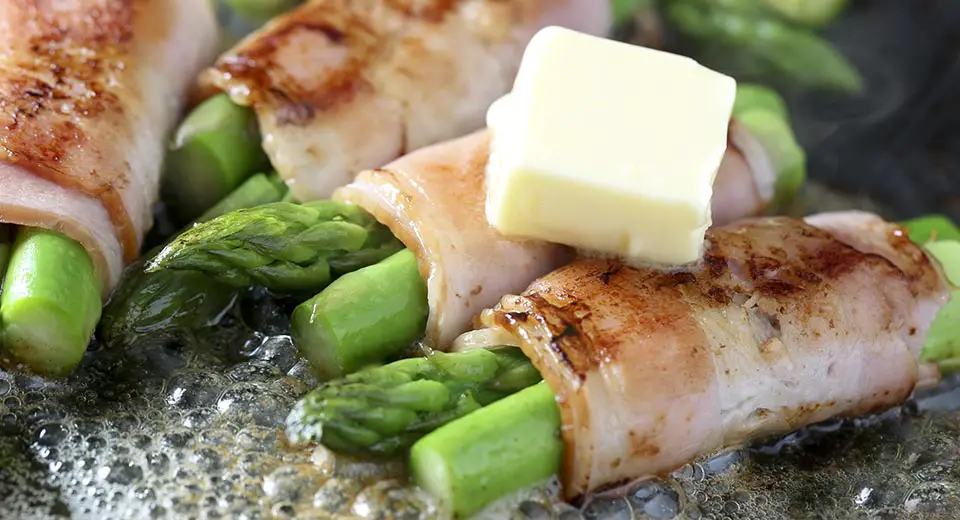
At first, getting into ketosis will be hard and you could experience what’s referred to as keto flu, during the first week. This means :
- Fatigue
- Brain fog
- Dizziness
- Headaches
- Bad mood
- Increases appetite and cravings
- Insomnia
- etc.
As a side note, I’m writing this on my 4th day of trying keto and I’m now feeling this keto flu pretty strongly. Please don’t mind the grammatical mistakes, I have a hard time typing on my keyboard as it is. 🙂
What’s important to know is that during the first week, you’ll experience weight loss, but it’ll mostly come from your body getting rid of water. Since your glycogen stores are being depleted, and glycogen is mostly water.
But once you’re into full ketosis, which could take up to 30 days for some people, you’ll totally leave these side-effects behind and you’ll start burning fat. Furthermore, your condition will be fully reversed.
Being in full ketosis will leave you with:
- Feeling more energized
- Being more focused
- Getting better sleep
- An improved mood
And of course, your body will become a fat-burning machine.
This low-carb, high-fat diet, when compared to a good old low-fat diet, is far more efficient when it comes to weight loss according to studies.
This study even found a staggering 2.2 times more weight loss with a ketogenic diet, when compared to a low-calory low-fat diet.
Not to mention other side benefits studies have found about low-carb and keto diets, that I already mentioned earlier. It can help reverse diabetes, increase insulin sensitivity, reduce metabolic syndrome, risks of cardiovascular diseases, risks of cancer, etc.
Lastly, just as fasting, any low-carb diet will boost your metabolic rate, your ability to burn calories. Meaning when you’ve reached the weight you want, getting back to an ordinary diet won’t cause massive weight gains.
Pros
- You will lose weight
- It will help reduce other severe conditions like diabetes or risks of cardiovascular diseases
- No time restricting eating windows
- Keeping the weight down won’t be hard
Cons
- You will have to reduce carbs to a minimum
- It’s quite restrictive and hard to follow, at least at first
- It’s not easy to keep up on an everyday basis (social life, restaurants, etc.)
How it compares to intermittent fasting
As for the Atkins diet, the ketogenic diet is actually great when combined with intermittent fasting for weight loss. The benefits you’ll get from fasting (and there are a ton) often correlate with the effects of keto.
Again, the main culprit of keto is to implement it in your everyday life, especially if you like your occasional drink or sugar treats. Of course, you could follow a keto diet up until your weight loss goal and then reimplement some carbs and cheat days.
But as I mentioned in this article on keto and cheat days, it’s not a very forgiving diet at that.
If you’re not much of a drinker and if you want to cure sugar addiction though, keto would be the perfect way to go. It’ll be hard of course, but replacing sugar with fat won’t take the fun out of eating, on the contrary.
And keto, like fasting, is known to help reduce cravings, reduce appetite and make you feel satiated more rapidly.
Paleo Diet
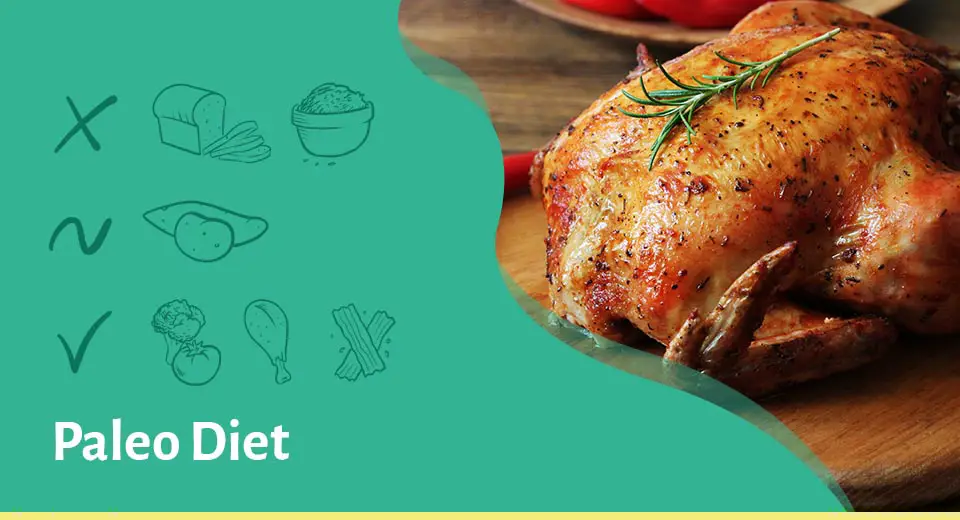
How it works
The Paleo diet is designed to fit the diet of our hunter-gatherer ancestors. The concept is clear: if cavemen weren’t obese, suffering cardiovascular diseases or diabetes, why not eat only what they could eat at that time?
Researchers aren’t absolutely sure of what our ancestors were eating, but they’re pretty sure it mostly consists of whole foods.

The Paleo diet doesn’t really have a plan, you just stick to the food you’re allowed to eat. There are variations with certain types of Paleo being more restrictive (not allowing potatoes for example) and other more permissive (allowing red wine).
You’ll be eating mostly meat, fish, seafood, eggs, fruits, seeds, nuts, vegetables and tubers (potatoes and such). Healthy vegetable oils and grass-fed butter are authorized, salt, spices, and herbs too.
In short, you’ll privilege healthy, organic wholefoods anytime you eat and will avoid any type of refined and processed foods (sugar, grains, beans, most dairy).
Effects on the body
Some effects of paleo are very similar to low-carb diet since you’re avoiding sugars and 80% of the other carbs on the market.
So, it’ll be effective for weight loss, depending on your habits prior to doing the diet, but cutting most sugars out will surely make you lose weight and improve your overall health.
This study done on healthy patients doing paleo shows that they lost an average of 5 pounds in 3 weeks and their body mass index decreased by 0.8. It also reduced their blood pressure.
Another study conducted specifically to see the effects of keto on cardiovascular risks factor in people with type 2 diabetes showed some weight loss (6.6 pounds) during the 3 months experiment and a decrease in triglycerides.
It also reduced their waistline, up to 4 cm more than people under a diabetes diet. Meaning Paleo will also promote the loss of visceral fat.
Lastly, this study took a look at the effects of Paleo on metabolical and physiological health. It reduced triglycerides by 35%, LDL cholesterol by 22% and insulin AUC by 39% (a meter used to measure insulin resistance).
So, this healthy, wholefood packed, sugar-free diet is actually really good for you and promotes weight loss. It figures!
Pros
- You will lose weight
- It will help reduce other severe conditions like diabetes or risks of cardiovascular diseases
- No time restricting eating windows
- Keeping the weight down won’t be hard
Cons
- No sugar and no refined carbs
- It’s not always easy to follow
- Depending on how strict you are with the diet, it can be quite restrictive
How it compares to intermittent fasting
Like a low-carb diet, Paleo can be a great complement to intermittent fasting, it also shares some benefits with IF such as reducing insulin resistance, blood pressure and triglycerides.
I’m starting to sound like a broken record, but any low-carb diet, complemented with healthy foods is a welcome addition to intermittent fasting. It will make you lose weight and improve your health.
Paleo will restrict what you can eat, it should be easier to follow than Keto and even the Atkins diet. I didn’t find weight loss comparisons of the 3 diets, but I would say Paleo comes third since it’s less strict on carbs.
It is still a sure way to make you lose weight, get rid of sugar addiction, etc. It all depends on what types of foods you enjoy the most and what you’re ready to give up to improve your condition.
I would argue if you’re not so hot about it, that implementing a light version of the paleo diet, allowing some drinks on the weekend and the occasional pizza with friends, while intermittent fasting, could be a great way to lose weight and create good habits on the long term, without going all in.
Mediterranean Diet
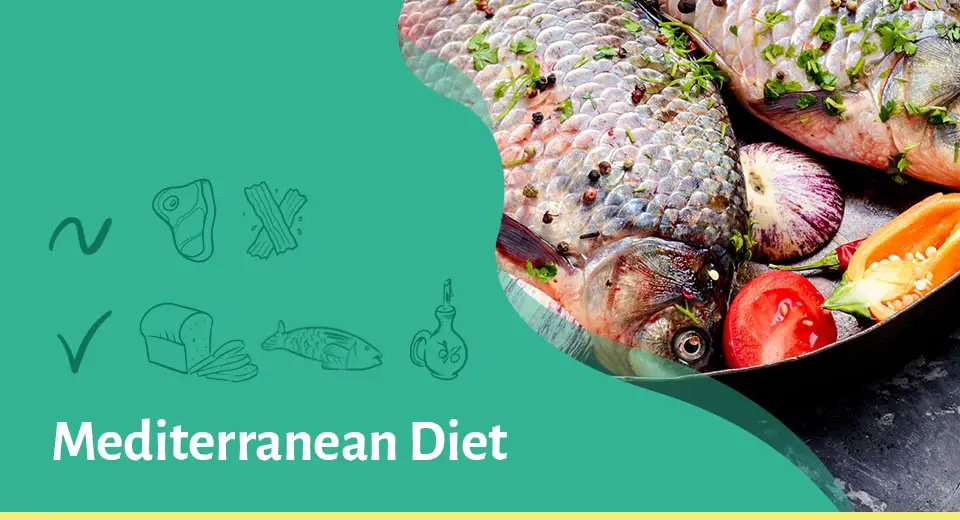
How it works
Researches found that people living in Mediterranean countries in the 60s, such as Italy or Greece, were a lot healthier than the average American.
The Mediterranean diet is based on this idea of copying the way they ate in these regions at the time.
This means you can eat vegetables, nuts, seeds, fruits, bread, whole grains, potatoes, herbs, fish, seafood and of course olive oil. You can also eat chicken, cheese, yogurt, and eggs in moderation and, more rarely, red meat.
Sugar, refined grains and oils, processed food, processed meat, trans fat, are all out of the question.
To give the complete list of do’s and don’ts can be difficult since there are many controversies about what to eat and not to eat. Search the Internet to find more info about it and stick to a list that suits you the most for your goals.
There’s no strict diet plan for a Mediterranean diet, you eat allowed foods in the right amount to satiety. In short, you eat organic, healthy, varied, natural foods. With an emphasis on fish and seafood.
When it comes to what to drink, some versions of the diet allow the occasional glass of wine, but that’s not a necessity of course. You’ll drink water, coffee, and tea and avoid any beverage with added sugar.
Effects on the body
As always with a healthy no-sugar diet, you’re going to lose some weight and it will help reduce risks of diabetes and cardiovascular diseases.
Although you’re still allowed to eat carbs, as long as you’re moderate about them, you’ll experience some benefits of the Mediterranean diet.
Here’s a study that compared the effects of three diets on 332 obese people: calorie-restricted low-fat, low-carb and calorie-restricted Mediterranean diet.
The results showed a weight loss of 6.4 pounds (2.9 kg) on the low-fat diet, 10.3 pounds (4.7 kg) with low-carb and 9.7 pounds (4.4 kg) with the Mediterranean diet.
This further emphasizes my point that going low-fat definitely isn’t a great way to lose weight, that low-carb is and that the Mediterranean diet is quite effective at that too. But it had some calorie restriction, mind you.
This study shows a reduction of around 30% in risks of combined heart attacks, stroke, and death from heart disease.
There are other studies such as this one on type 2 diabetes or this one on metabolic syndrome, all exploring the benefits of the Mediterranean diet.
Pros
- You will lose weight
- Apart from sugar and refined food, you can eat any healthy food
- It will help reduce other severe conditions like diabetes or risks of cardiovascular diseases
- No time restricting eating windows
- Keeping the weight down won’t be hard
Cons
- No sugar and no refined carbs
- It’s not always easy to follow
- Depending on how strict you are with the diet, it can be quite restrictive
How it compares to intermittent fasting
Again, the Mediterranean diet could be a good addition to intermittent fasting, as with any other healthy diet.
It will still be hard to follow it if you like having drinks with friends or junk foods and sugar treats now and then, but it’s definitely one of the easiest diets to follow on this list.
You don’t have to cut carbs altogether, but you’ll still have to avoid sugar. Let me tell you from experience, as long as you can get some carbs such as bread or potatoes, it will be a lot easier to cut sugar.
As for weight loss, I don’t think the Mediterranean diet can quite compete with a low-carb diet. You won’t lose as much and not as quickly, so it might not be for everyone.
But if you’re looking to implement a more healthy diet and you love fish and seafood, that’s definitely a great way to eat. Did you ever go to Italy? That’s the best cuisine on earth!
Intermittent fasting still has it’s advantages since there are no food restrictions, you’ll be eating less without realizing it and you won’t have to ask the waiter to change this and that on a plate when ordering something at a restaurant.
But if you want to complement IF with a not too-hard-to-follow diet, that’s a great alternative.
Like intermittent fasting, the Mediterranean is not the best for immediate weight loss, but it’s easy enough to implement in the long term.
Carnivore Diet
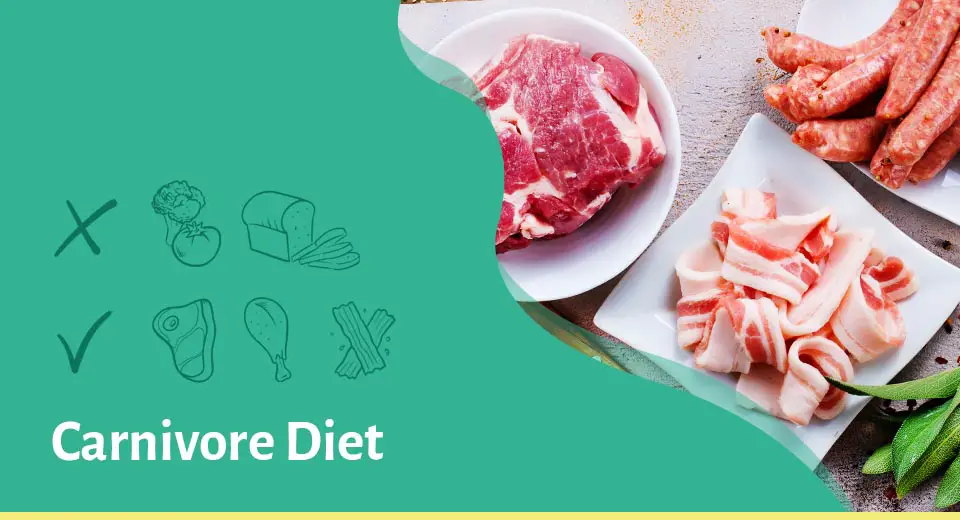
How it works
From one extreme to the other!
The carnivore diet has become some kind of a trendy subject lately. First off, it’s important to know that most of the effects of the carnivore diet come from anecdotes and experiences, not so much from researches.
In fact, the carnivore diet is pretty new and has a very weak scientific backing for now.
But still, I wanted to mention it because I read really interesting things on the subject and it’s quite a crazy diet. It’s also known as the zero-carb diet.
What do you eat on a carnivore diet? Only animal-sourced foods: meat, fish, seafood, eggs, high-fat dairy products, and animal fats.
That makes it maybe the most restrictive diet on this list and also, as you can imagine, the hardest to follow on an everyday basis and the most controversial.
Some adherents to the diet even go as far as eating only meat, salt, and water.
Effects on the body
I won’t be able to cite studies to prove any point here, but people have been talking about their experience with the carnivore diet and how it helped them.
Of course, the diet being zero-carb and high in animal fat, it should prove easy to lose weight with it. That’s why some people use this diet to go further on the low-carb alternative.
Dr. Paul Mabry, a zero-carb doctor who blogs about it, says that people doing carnivore will try it to cure persistent health issues that low-carb or keto didn’t solve. For him, it was his crippling sugar addiction.
When on low-carb, he plateaued after a while. He realized he was so hung up on sugar, that he was binging on vegetables to get its fix. Going zero-carb help him cure his sugar addiction, he also lost lots of weight in the process.

There are also testimonies of people getting rid of eczema, migraines, IBS, and a woman even claims that following a carnivore diet for seven months helped reverse glaucoma. Again, there’s no evidence to prove this.
Keto, low-carb, fasting can all help get rid of diseases and problematics conditions, the carnivore diet is taking this idea to the next level by removing any type of glucose intake.
I couldn’t recommend doing this diet with so little evidence, but depending on your condition, it might be beneficial.
It’s not exactly a diet you would use to simply lose weight, you should have other specific health goals when trying it.
Pros
- You will lose weight
- It could help drastically certain conditions, going beyond low-carb or fasting
- No time restricting eating windows
- Keeping the weight down won’t be hard
Cons
- It’s amazingly restrictive
- It’s really hard to follow
- There is no scientific evidence that the diet is safe for now
- No more scientific evidence that the claimed benefits are real
How it compares to intermittent fasting
It’s a no-carb diet, so it goes right in there with fasting, but as I said before, this is so specific, restrictive and evidence on the impact of this type of diet are so thin that you should only do it with all the information on hand.
That’s not a miracle cure-it-all diet. Yes, you’ll be cutting out all carbs, which could help in many conditions, but you’ll also be eating a very restricting type of food.
It’s been argued that most nutrients can be found in animal-sourced food, but again, no real studies have been conducted to say it’s a safe diet to follow.
The carnivore diet is not so much a means to lose weight as it is a way to improve or cure certain conditions. And it should be viewed and studied in the light.
Now, fasting is known to have lots of benefits, and some of the effects you could get from going carnivore (sugar addiction, health issues), could be helped with simple IF or maybe by trying prolonged fasts.
Fasting has an abundance of studies to prove it’s benefits, maybe check that out before going carnivore.
What diet is the best?
As I said earlier the idea here is to compare the effectiveness of intermittent fasting, how easy it can be to implement and its health benefits against other well-known diets.
The thing is, there are many reasons to implement a specific diet, it could be for weight loss, of course, to improve a disease or condition, or simply your overall health or the way you eat.
And even when it comes to intermittent fasting, there are many ways to do IF and again, it’ll produce different effects and it’ll be more or less effective depending on which you choose.
Furthermore, most of the trendy diets out there implement some type of low-carb and remove most sugars from the alimentation, that’s why they share many of the same benefits.
Now, it’s up to you to look up each diet and see what fits you, what you feel you can do (cut sugar for example) and can’t do (cut carbs altogether maybe). Before trying keto, why not trying the Paleo diet?
As you can see, I often mentioned that you could do intermittent fasting in pairs with those diets.
That’s what’s so great about fasting: it’s not a diet.
It’s simply a habit you’ll create to eat less often. How often (16/8, 5:2, alternate day, etc.) is up to you and what works best for you, but that’s it, really.
I know you might think: “Great, a diet comparison in which there’s no real comparison to be made”. That’s exactly the point!
You don’t have to count calories or carbs, you don’t have to stay away from any food you love if you don’t want too. That can come later with any of the aforementioned diets (maybe not the first two though) if you want to take it a step further.
But simply implementing IF will help you see you don’t need to be constantly eating, you can lose weight without too much effort, you can combine it with any diet that fits your needs and it’s always a good addition to any lifestyle you might have.
I’m advocating fasting because it’s simply a new lifestyle that will make you lose weight but also have many other benefits, without being too restrictive or difficult to implement.
And when you’re used to it, it is so freaking easy!

